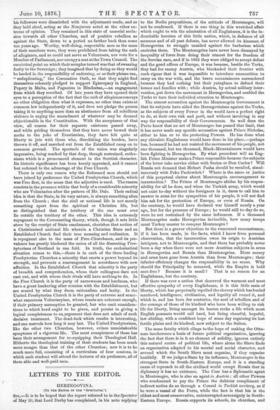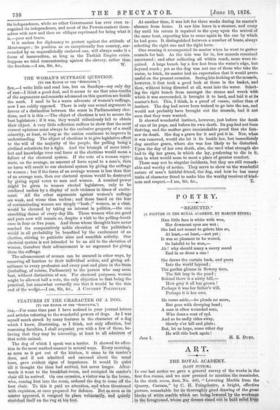LETTERS TO THE EDITOR.
HERZEGOVINA.
[TO THE EDITOR OF THE " SPECTATOR:1 Sin,—It is to be hoped that the report referred to in the Spectator of May 20, that Lord Derby has complained, in his note replying
to the Berlin propositions, of the attitude of Montenegro, will not be confirmed. If there is one thing in this wretched affair which ought to win the admiration of all Englishmen, it is the in- domitable heroism of this little nation, which, in defiance of all menaces and of all past defeats, has never allowed its kinsmen of Herzegovina to struggle unaided against the barbarism which encircles them. The Montenegrins have never been dismayed by inequality of force from doing their utmost for the freedom of the Servian race, and if in 1862 they were obliged to accept defeat and the good offices of Europe, it was because, beside the Turks, they had for enemy Austria, who blockaded their frontier with such rigour that it was impossible to introduce ammunition to carry on the war with, and the brave mountaineers surrendered because they had nothing but their yataghans to defend their homes and families with ; while Austria, by actual military inter- vention, put down the movement in Herzegovina, and enabled the Turks to turn their individed attention to Montenegro.
The utmost accusation against the Montenegrin Government is that its subjects have aided the Herzegovinians against the Turks, as the subjects of every Power in the world have a perfect right to do, at their own risk and peril, and without iavolving in any way the responsibility of their Governments. So well does the Porte know that no act of Montenegro has passed that limit, that it has never made any specific accusation against Prince Nicholas, either to him or to the protecting Powers. He has done what any chivalric Englishman would have done in his place,—perhaps less, because if he had not resisted the movement of his people, not one thousand, but ten thousand, Black-Mountaineers would have been fighting in Herzegovina. By what precedent will an Eng- lish Prime Minister make a Prince responsible because the subjects of the latter take service either with Socica. or Don Carlos ? Will Russia not demand that Hobart Pasha should be recalled, simul- taneously with Peko Paulowitch? Where is the sense or justice of this perpetual clatter about Montenegrin encouragement to insurrection? The Prince of Montenegro abides by his respon- sibility for all he does, and when the Turkish army, which would not exist to-day without the foreigners in it, dares to call him to answer in arms for the sympathies of his people, it will not find him ask for the protection of Europe, or even of Russia. On the contrary, he would have declared war himself nearly a year ago, but for the pressure of Europe ; he would still to-day do so, were he not restrained by the same influences. If a thousand Montenegrins make Herzegovina invincible, how many troops must Turkey muster to conquer Montenegro ?
But there is a graver objection to the rumoured remonstrance, if it has been made, in the facts, which I know from personal observation, that the insurrection owes its origin to Austrian intrigues, not to Montenegrin, and that there has probably never been a day when there were not more Austrian subjects in arms in Herzegovina and Bosnia than Montenegrins. More money and arms have gone from Austria than from Montenegro ; their inferior efficiency changes the responsibility in no sense. Why should the Principality be menaced, while the Empire is held scot-free ? Because it is small ? That is no reason for an Englishman, but the contrary.
If there was ever a nation that deserved the warmest and most effective sympathy of every Englishman, it is this little oasis of liberty, which has perpetually repelled the slavery which has buried manhood, intelligence, civilisation, and legality all round it, and which is, and has been for centuries, the soul of rebellion and of the courage of those of its kindred who have been willing to risk life for liberty, living amongst its barren rocks a life which most English peasants would call hard, but living cheerful, hopeful, law-abiding, with a confident hope of some day regaining its lost fertile plains and its kindred, now subject to the Sultan.
The same fatuity which clings to the hope of making the Otto- man incoherence a basis of future political organisation, ignoring the fact that there is in it no element of solidity, ignores entirely this natural centre of political life, where alone the Slave finds an organisation adapted to his mental and social character, and around which the South Slays must organise, if they organise healthily. If we judge a State by its influence, Montenegro is the strongest State in South-Eastern Europe, and it is a standing cause of reproach to all the civilised world except Russia that in diplomacy it has no existence. The Czar has a diplomatic agent in Montenegro, who is also an agent in Austria ; all other Powers who condescend to pay the Prince the dubious compliment of indirect notice do so through a Consul in Turkish territory, as if he were a vassal of the Porte, while the fact is that his is the oldest and most conservative, uninterrupted sovereignty in South- Eastern Europe. Russia supports its schools, its churches, and its independence, while no other Government has ever even re- cognised ita independence, and most of the Powers content them- selves with now and then an oblique reprimand for being what it is,—poor and brave. It is useless for diplomacy to protest against the attitude of Montenegro ; its position as an exceptionally free country, sur- rounded by an unparalleledly enslaved one, will always make it a focus of insurrection, as long as the Turkish Empire exists. Suppose we tried remonstrating against the slavery, rather than































 Previous page
Previous page